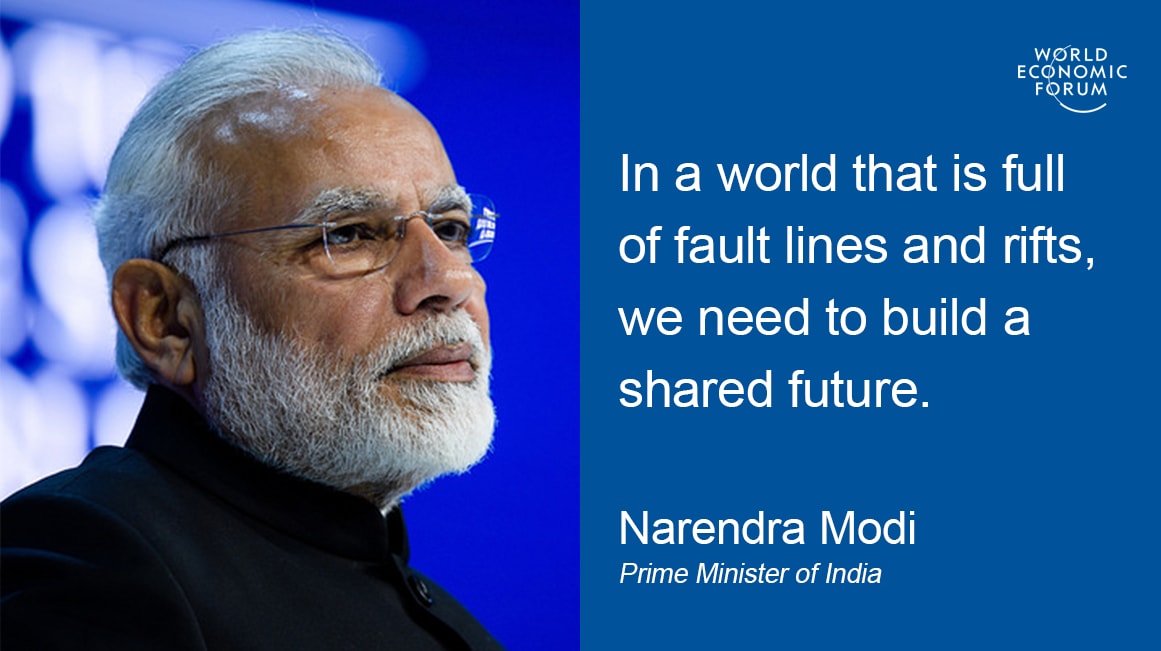https://www.weforum.org/agenda/2018/01/narendra-modi-davos-these-are-the-3-greatest-threats-to-civilization
Narendra Modi: These are the 3 greatest threats to civilization

'We have to accept the fact that globalization is slowing losing its lustre'
Image: World Economic Forum/Manuel Lopez
23 Jan 2018
Our Impact
Climate change, terrorism and the backlash against globalization are the three most significant challenges to civilization as we know it, Indian Prime Minister Narendra Modi said at the World Economic Forum’s Annual Meeting 2018 in Davos, Switzerland.
Modi, leader of the fastest growing major economy in the world - as well as the world’s largest democracy - delivered a special address during which he also spoke about the opportunities and dangers of technology, India’s plan to fight income inequality, job creation, and how the country is “cutting the red tape and rolling out the red carpet” to international trade and investment.

“In a world that is full of fault lines and rifts, we need to build a shared future,” Modi said.
“With new forces arising, the balance between economic capabilities and political power is changing at great speed. Because of this, we can foresee far-reaching changes in the nature of this world with respect to peace, stability and security.”
“The challenges we face are as numerous as they are daunting,” Modi said, before focusing on the three main challenges he believes “pose the greatest threat to the survival of human civilization.”
Climate change
“Glaciers are receding, ice caps are melting in the Arctic, many islands are sinking… There can be floods, or there can be drought, we are seeing the impact of extreme weather conditions,” he said.
Countries have failed to work together and to live up to their environmental pledges, said the Indian PM. “We should all have come out of our limited narrow confines and we should have demonstrated solidarity.
“Everyone talks about reducing carbon emissions but there are very few people or countries who back their words with their resources to help developing countries to adopt appropriate technology. Very few of them come forward to help.”
We have moved from a model of frugal consumption, to needs-based consumption, to greed-based consumption, said the Indian Prime Minister. “Has this been development or has this been our downfall?” he asked.
Modi then shared his country's ambitious goal to shift to greener forms of energy.
“To save the environment and to fight climate change, my government has planned a very big campaign and given itself very tough objective,” he said. “By the year 2022, in India we want to produce 175 gigawatts of renewable energy. This is a very big target for a country like India.”
In the last three years, India has achieved approximately 60 gigawatts, around a third of this target.
Terrorism
The second great threat facing humanity is terrorism, Modi went on to say.
“Terrorism is dangerous, but equally dangerous is the artificial distinction created between good and bad terrorists,” he said.
The radicalization of young people is of particular concern to the Prime Minister.
“The other serious contemporary aspect to which I wish to draw your attention, is that educated, well-to-do youth are being radicalized… I hope that this forum will discuss solutions to the fault lines created by terrorism and violence.”
Globalization
Modi also addressed the rejection of the principles of globalization in some countries and parts of the world.
“Many societies and countries are becoming more and more focused on themselves,” he said. “It feels like the opposite of globalization is happening. The negative impact of this kind of mind-set and wrong priorities cannot be considered less dangerous than climate change or terrorism.
“Everyone is talking about an interconnected world, but we will have to accept the fact that globalization is slowing losing its lustre.”
In its place, “the forces of protectionism are raising their heads against globalization. Their intention is not just to avoid globalization, but to reverse its natural flow.”
This raises barriers which are punishing people in developing countries. Trade agreements have come to a standstill, many nations have seen a decrease in cross-border investment, and growth in the global supply chain has been stopped.
“The solution to this worrisome situation against globalization is not isolation. The solution is in understanding and accepting change.”
You can watch the speech in full here.
Share



沒有留言:
張貼留言